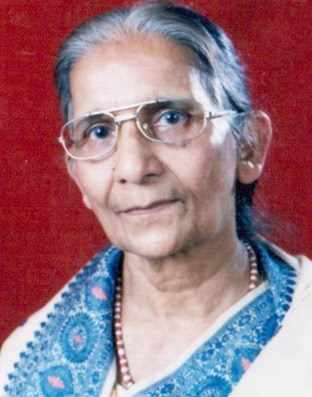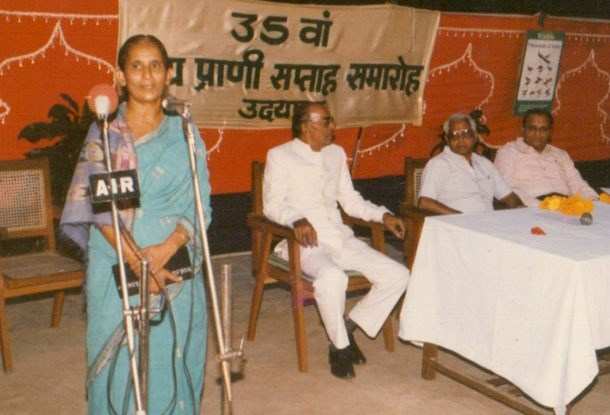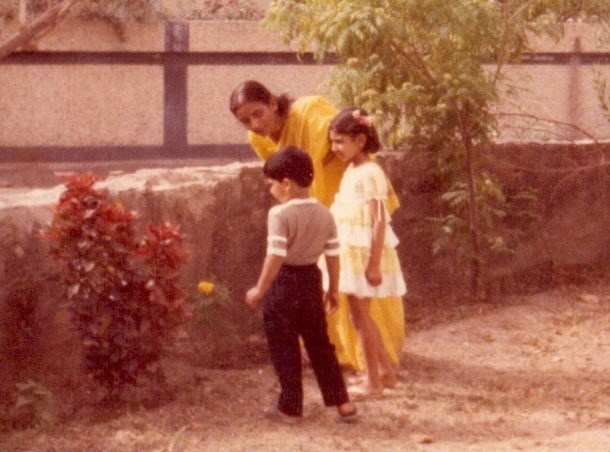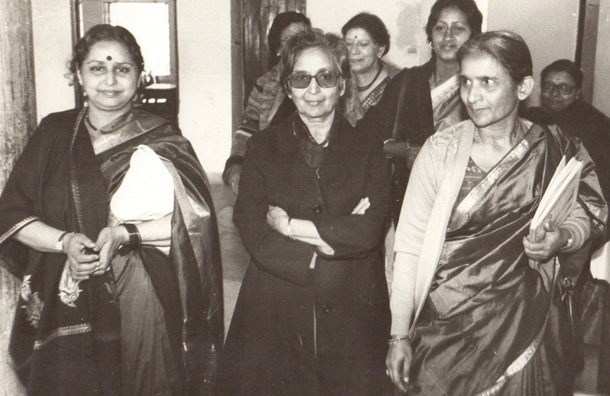Razia Tehsin: The Woman with a Golden Heart
“It is curious that physical courage should be so common in the world and moral courage so rare,” Mark Twain had once said. The life of Razia Tehsin, a woman from the beautiful laid-back town of Udaipur, was woven with exceptional moral courage.
Social activist. Author. Editor. Educationist. There are many titles to define her, but not a single one that does entire justice to a life spent for others, to a woman who didn’t wear gold on her person but in her heart. Born on 12th July 1936, Razia was greatly inspired by Mahatma Gandhi and became a follower of Indian Socialist philosophy. Instrumental in the formati
Article by Arefa Tehsin

“It is curious that physical courage should be so common in the world and moral courage so rare,” Mark Twain had once said. The life of Razia Tehsin, a woman from the beautiful laid-back town of Udaipur, was woven with exceptional moral courage.
Social activist. Author. Editor. Educationist. There are many titles to define her, but not a single one that does entire justice to a life spent for others, to a woman who didn’t wear gold on her person but in her heart. Born on 12th July 1936, Razia was greatly inspired by Mahatma Gandhi and became a follower of Indian Socialist philosophy. Instrumental in the formation and running of many institutions and organisations, Razia never accepted any paid post.
She was closely associated with eminent writers, politicians and social workers, and they remained impressed with her selflessness, strong will and candour. Fondly called Rajju apa and Majji (middle sister) by elders and children, she was loved and respected by all.
Since her early youth, Razia started working for women’s education and emancipation and selflessly got attached to many institutions. Her source of inspiration was her mother Mrs. Khursheed Banu Tehsin, who, in spite of having a severe disability herself, worked for women upliftment. Mrs. Khursheed had started ‘Bazm-e-Niswan’ for generating awareness amongst women.
She served as the Vice President of the Rajasthan Branch of All India Women’s Conference (AIWC), of which Maharani Gayatri Devi was the President, way back in 1952.
Razia’s inspiration was drawn not only from her mother but also from her father, the then Vice Mayor Shri T. H. Tehsin, who was a progressive thinker. He always encouraged his family to practice freedom of thought and participate in social causes.
He later officiated as the Mayor of the Udaipur Municipal Corporation. A social worker and nature lover, T. H. Tehsin was also an associate of Shri Manikya Lal Verma and Shri Mohan Lal Sukhadiya during the Independence Movement.
Razia did her Bachelor’s degree from Maharana Bhupal College, Udaipur and her “Adeeb Kamil” (Masters) in Urdu from Aligarh University’s centre at Anjuman School in Udaipur.

Social Work:
Razia, along with her sister Habiba Banu, became active in the Udaipur branch of Rajasthan Mahila Parishad started in 1948 by freedom fighter Mrs. Shanta Trivedi. Her husband, freedom fighter and socialist Mr. Parashram Trivedi made Razia and Habiba his sisters and maintained this relation till the very end. Razia acted as the Joint Secretary and then Secretary of Mahila Parishad for a long period of time.
A student of Vidya Bhawan (founded 1931), Razia stood thick by the founder ‘Bhai Sahib’ Dr. Mohan Singh Mehta and President Mr. Kesrilal Bordia during the Society’s roughest phase during 1970’s-80’s. She executed her responsibility as the Joint Secretary of Vidya Bhawan Society to the best of her ability during that tough period. She was a member of Vidya Bhawan’s Board of Control for six years.
Razia was an active member of Vidya Bhawan Vidya Bandhu Sangh (Alumni Association) and contributed in a lot of ways. Some of the key things she did are as below:
1. An ex-student of Vidya Bhawan was a victim of dowry death, wherein she was burnt alive. The alumni of Vidya Bhawan took up this issue and fought for long until legal action was taken.
2. After a gap of decades the publication of annual journal ‘Vidya Bandhu Mukhapatra’ started again. Razia was its first Editor.
The founders of Mahila Mandal, Mrs. Kamla and Mr. Dayashankar Shotriya, who were inspired from Mahatma Gandhi, had close ties with Razia. She became the Joint Secretary and then Secretary of Mahila Mandal and worked for girls’ education as well as economic empowerment through Grih Udyod Pratishthan (a cottage industry of Mahila Mandal)
 She was the member of Rajasthan Social Welfare Department’s High Power Committee for Women and Child Development in 1975-76.
She was the member of Rajasthan Social Welfare Department’s High Power Committee for Women and Child Development in 1975-76.
- As a member of Kishore Kalyan Board (Juvenile Welfare Board), Udaipur Division, Razia did significant work and presided as Hon. Magistrate of Juvenile Delinquency Court as well.
- She was the Vice President of Bharat-Tibet Maitri Sangh (Indo-Tibet Friendship Society) and President of Sanjhi organisation.
- She was a member of the Board of Control of Seva Mandir (founded by Padma Vibhushan Dr. M.S. Mehta to serve in tribal areas), in the Executive Committee of Lok Jumbish and General House of Bhartiya Lok Kala Mandal (founded by Padma Shri Devilal Samar).
- Razia was a member of Gandhi Peace Foundation, Sarvoday Mandal, S. M. Joshi Foundation, Lekhika Sangh and Association for Writers and Illustrators.
- She played an active role in the camp of Gandhi Peace Foundation organised at ‘Vishwaneedam’ near Bangalore and in many other camps inspired by Gandhiji and Socialist ideology across India
- Many organisations honoured for her contributions to the society.

Political Work:
- Stirred and inspired by Gandhi, Dr. Ram Manohar Lohia and Jaiprakash Narayan, Razia Tehsin remained an active worker of Praja Socialist Party (PSP) and Socialist Party (SP).
- She held different offices of responsibility in Janta Party and Janata Dal.
- In Janta Dal she served as the General Secretary of Rajasthan State and as member of National Mahila Sabha’s (Women’s wing’s) Steering Committee.
Literary Work:
- Through her book Shikari Shikar Jungle Se Pyar, Razia brought to life the socio-cultural and environmental state during six to seven decades of the 20th century. The Human Resource Development Ministry’s Central Hindi Directorate awarded her for this book in 1986-87. The Udru Bureau of New Delhi had it translated in Urdu.
- She translated to Hindi the experiences of British officers in the Asian jungles. The collection was published as “Romanchkari Shikar Kathaein”.
- For Bombay Natural History Society (BNHS) Razia translated Richard Grimmett’s and Tim Inskipp’s Birds of India. BNHS published it as “Uttar Bharat ke Pakshi.”
- Razia’s articles and stories were published in prestigious Indian magazines and newspapers like Dharmyug, Sarita, Kadambini and Saptahik Hindustan. Women exploitation and empowerment, educational stories for children, jungles and shikar, herbs, environment – she beautifully put her pen to paper to cover various topics.
- Her talks on social issues were broadcasted and telecasted by Aakashvani and Doordarshan
- She was a life-member of Lekhika Sangh and contributed regularly to its various publications.
- She worked as the Editor of Angad, a magazine published from Boondi.
- For a period of ten years, she successfully edited “Mukhpatra” – the annual journal of Vidya Bhawan’s Alumni Association.
- Razia travelled across many states of India and captured their distinctive characters in her memoirs and snapshots.
- She shared close relations with literary figures like Krishna Sobti, Amrita Preetam, Kamla Vatsyayan, Sulochana Rangaye Raghav, Sachchidanand Hiranand Vatsyayan “Agyey”, Dharamveer Bharati, Laxmikant Varma and Nand Chaturvedi
- Her unpublished works include memoirs, articles, stories, ghazals and Urdu couplets.
- Her books Shikari Shikar Jungle Se Pyar and Romanchkari Shikar Kathayein will be reprinted this year.
Razia Tehsin passed away on 30th January 2012 after a long battle with cancer. Her legacies are the smiling faces of women she fought for, her beautiful words that evoke tears and laughter and the change that a single woman can bring about. She was like the fire that burns down all obstacles and leaves not a trace of itself behind, but a cleared path for others to carry on their journey.
To join us on Facebook Click Here and Subscribe to UdaipurTimes Broadcast channels on GoogleNews | Telegram | Signal


